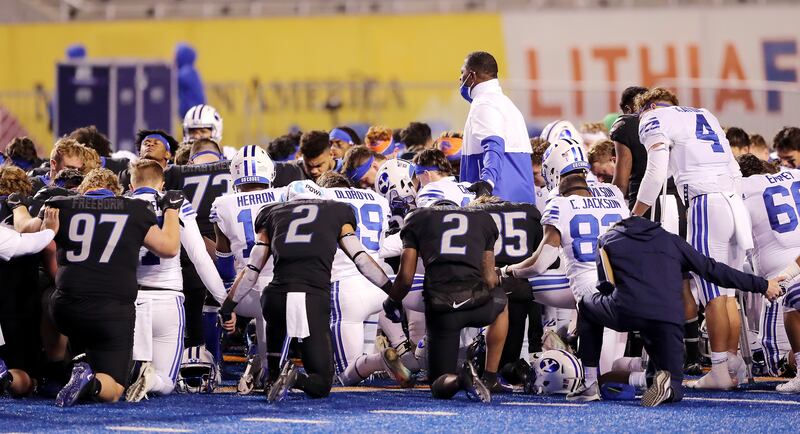The Freedom From Religion Foundation is a group well-known for going overboard in an effort to yank religion out of public life. As an example, the group most recently coerced a Kansas City School District into canceling a drive to give Christmas gifts and other needed items to underprivileged children because the drive was sponsored by a Christian relief organization.
The word “heartless” comes to mind. So does “ridiculous.”
We’re referring to the school district.
Foundations that advocate removing religion from the public square have a right to exist. It’s the way so many public institutions jump when they call that is troubling.
Add Boise State University to that list.
Fans of both Boise State and Brigham Young University had their spirits lifted last month when, at the end of a hard-fought football game, players from both teams held hands on the field and joined in a prayer. They were led by Boise State’s team chaplain Mark Thornton.
The prayer was a voluntary display that brought together an estimated 85% to 90% of the combined players on both teams. It was a powerful reminder that the passions of a hard-fought football game take secondary importance to the concepts of brotherhood, mutual respect and human kindness. Players from many denominations participated.
It was exactly the kind of thing the nation — divided by bitter partisanship and a pandemic — needs more of.
But, apparently, it was a problem in the eyes of some.
The Freedom From Religion Foundation sent a letter to the university asking it to terminate the position of team chaplain. The university responded quickly, and the school’s general counsel wrote a letter that said it was educating the athletic department “to ensure measures are taken now and in the future to resolve the issue and establish appropriate constitutional boundaries.”
The “issue” seems to be a spontaneous and widespread exercise of religion, which is expressly guaranteed as a right in the Constitution. We don’t see a problem with that, either in terms of public education or in relation to the law.
What is worse, the university went on to assure the foundation that the chaplain would no longer travel with the football team, nor would the school ever refer to him again as being associated with the team. Presumably, he still exists and still can provide counsel and compassionate service to players, if they happen to hear about him.
All that is required is a bit of backbone, and some compassion for the things many people recognize as mattering most.
We hope so. Playing Division I college football can be difficult, and not just physically. Often, student athletes are far from home and support structures. They may feel lonely or lost. Having a team chaplain sounds like an excellent, compassionate idea.
Thornton is a volunteer, a former Boise State athlete with a genuine love and concern for today’s student athletes. The university should consider itself fortunate to have him.
Instead, Boise State has all-too-quickly given in to unreasonable voices that seek to intimidate and coerce organizations into severing all ties with religion — an irony, considering intimidation and coercion were the false claims the foundation made about postgame prayer sessions.
Given recent decisions by the U.S. Supreme Court, even before the recent appointment of Justice Amy Coney Barrett, it is doubtful that claims against a volunteer chaplain would stand. All that is required is a bit of backbone, and some compassion for the things many people recognize as mattering most.

